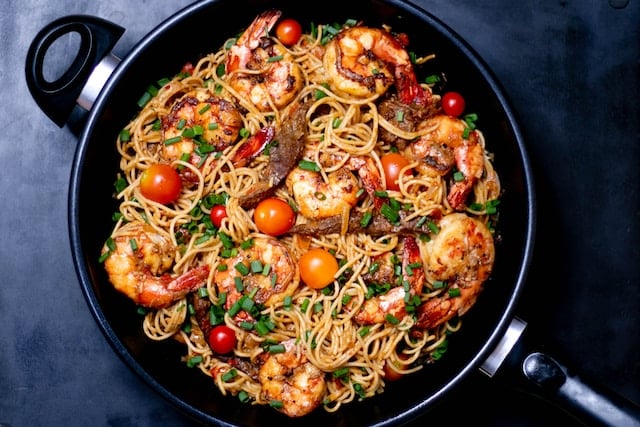Tips for quick and efficient cooking

Mastering the Art of Preparation
When it comes to embracing efficiency in the kitchen, the heart of the matter lies in the art of preparation. The French culinary term, ‘mise en place,’ meaning ‘everything in its place,’ teaches us that getting organized before you start cooking is fundamental. This simple preparatory stage can save you substantial time and energy in the long run.
Start by reading your recipe thoroughly before you begin. By doing so, you will have a clear understanding of the entire process, which will help you plan your cooking efficiently. Gather all the necessary ingredients, utensils, and equipment beforehand. It will prevent rushing around the kitchen looking for that elusive pan or knife in the heat of cooking.
A découvrir également : Discovering Latin American cuisine
Prepping your ingredients in advance, such as chopping vegetables or marinating meat, can be a real time-saver. Remember, you don’t have to wait until you’re ready to cook to start prepping. Most ingredients can be prepared hours or even days ahead. Just make sure to store them properly to maintain freshness.
Applying the Right Cooking Techniques
Choosing the right cooking techniques can drastically reduce your cooking time and energy use. For instance, steaming vegetables rather than boiling them will not only save you cooking time but also retain more nutrients. Similarly, using a pressure cooker can considerably decrease the cooking time of certain meals, like beans or stews.
Cela peut vous intéresser : Secrets to successful homemade pasta
Using your oven efficiently can also help save energy and make your cooking more efficient. Remember that every time you open the oven door, heat escapes, extending your cooking time. So, don’t keep checking your food – trust your oven and the cooking times given in your recipe.
When cooking on the stove, make sure to use a pan that matches the size of the burner. A small pan on a large burner will waste heat and energy. Also, covering the pan with a lid will trap heat, allowing your food to cook faster.
Enhancing your Kitchen Tools
Investing in good quality kitchen tools can make a massive difference in your cooking efficiency. Sharp knives, for instance, will make the prep stage quicker and safer. A blunt knife can slow you down and even pose a risk of injury.
Consider using multi-functional kitchen appliances. Devices like a food processor can chop, slice, blend and even knead dough, saving you a lot of time. An Instant Pot can act as a pressure cooker, slow cooker, and a rice cooker, making it a versatile tool in the kitchen.
Not all your kitchen tools have to be high tech or expensive. Even simple gadgets like a garlic press or a lemon squeezer can make a difference in your efficiency, saving you time and energy over the long term.
Efficient Use of Leftovers
Efficient cooking is not just about how quickly you can prepare a meal. It is also about how well you manage your food resources. Leftovers, if handled correctly, can be a real time and energy saver.
Rather than seeing leftovers as a burden, view them as a head start on your next meal. Leftover meat can be added to soups or salads, while leftover vegetables can make a quick stir-fry. Leftover rice could be turned into a delicious fried rice or a comforting rice pudding.
To make the most of your leftovers, plan your meals strategically. For instance, if you’re making roast chicken for dinner, plan to use the leftovers in a chicken salad for lunch the next day. This not only saves you cooking time but also reduces food waste, making your cooking more efficient and eco-friendly.
Organizing Your Kitchen for Efficiency
The layout of your kitchen can also impact your cooking efficiency. Keeping your kitchen organized and clutter-free will save time and energy by making your workspaces more efficient.
Keep items you frequently use within easy reach. Store your pots and pans near the stove and keep your utensils close to the prep area. This will save you time and energy as you won’t have to go searching for them while you’re cooking.
Similarly, grouping similar items together can make your kitchen more intuitive. For instance, keep all your baking ingredients and tools together. When you’re ready to bake, you’ll have everything you need in one place.
Remember, an efficient kitchen isn’t necessarily the biggest or the most modern. It’s about creating a space that works for you and your cooking style.
Understanding the Power of Efficient Appliances
Opting for energy-efficient appliances can play a vital role in reducing your cooking time and energy bills. For example, slow cookers are true champions of energy efficiency. These appliances use just a little more energy than a traditional light bulb and can cook food to perfection, needing minimal supervision.
Similarly, induction hobs are another energy-saving option. They heat food by creating a magnetic field, which means they heat the pot or pan, not the hob. This, in turn, makes them significantly more energy-efficient than conventional electric or gas hobs.
Air fryers are another prime example of efficient cooking appliances. They use up to 70% less oil than a deep fryer, promoting healthy eating habits. Besides, air fryers are quicker than conventional ovens, saving you precious time in the kitchen.
Even your fridge freezer can contribute to energy efficiency. Keeping these appliances full increases their efficiency because the mass of cold items inside helps to keep the temperature down, reducing the amount of work your fridge or freezer needs to do.
Finally, if your budget allows, consider investing in a convection oven. It circulates hot air around the food, speeding up the cooking process and reducing energy usage. Regardless of your choice of appliances, remember to maintain them well, as proper maintenance ensures optimal performance and longevity.
Conclusion: Embrace the Culture of Efficient Cooking
Embracing the culture of efficient cooking is about adopting smart habits that save time and energy, ultimately leading to a more sustainable and enjoyable experience in the kitchen. It’s about understanding that preparation is key, using the right cooking techniques, investing in efficient kitchen tools, making good use of leftovers, and organizing your kitchen for maximum efficiency.
Every step you take towards making your cooking habits more energy-efficient is not just good for you; it’s good for the planet. By reducing your energy usage, you’re also reducing your carbon footprint, contributing to a healthier environment for all.
Remember, it’s not just about the tools you have in your kitchen or the appliances you use. It’s also about your mindset and how you approach the cooking process. So, take these tips on board, gradually incorporate them into your routine, and watch your kitchen transform into a realm of efficiency.
In the end, efficient cooking is more than just a means to an end. It’s a way of life that, once adopted, can make your time in the kitchen more enjoyable and rewarding, while also contributing to a more sustainable world.
